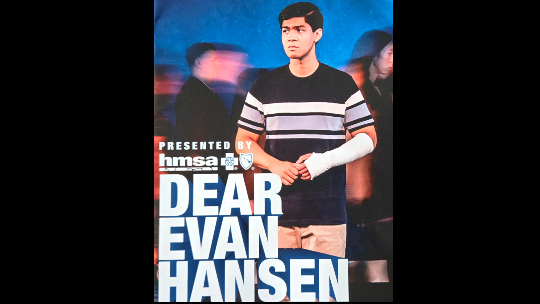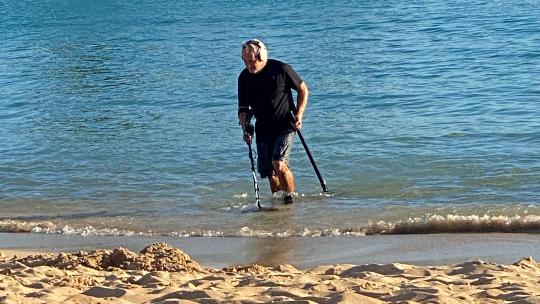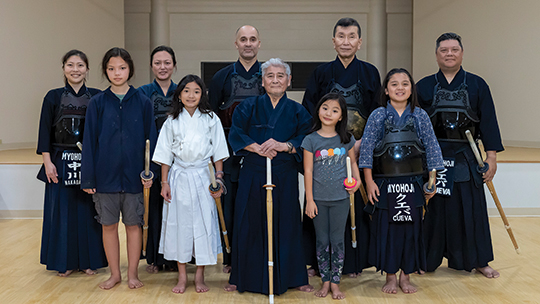What do beans, a sense of purpose, and your friends have in common? They can all help you to live a more vibrant life.
Increasing life expectancy is a simple recipe for Dan Buettner. There’s no magic pill to take. No fad diet to follow. And you don’t have to spend countless hours in a gym pumping iron. His advice to living a longer and healthy life combines a mixture of ingredients. From your eating habits to the people you surround yourself with; you can live your life with more vitality and zest.
Buettner was recently on Oahu and Hawaii Island as part of the Blue Zones Project Community kick-off events for Koolaupoko (Windward Oahu), North Hawaii, and East Hawaii. These communities are joining a handful of other communities across the country in their commitment to change their landscape so the healthy choice becomes the easy choice for residents. Blueprints are underway to make impactful changes in public policy, workplaces, restaurants, and schools.
I sat down with New York Times bestselling author, National Geographic Fellow, and longevity expert to talk about his new book, “The Blue Zones Solution,” Power 9® principles, and his personal lifestyle habits. Here’s an excerpt of lessons Buettner has taken from the Blue Zones, which have influenced countless individuals around the globe to emulate life like individuals in those regions.
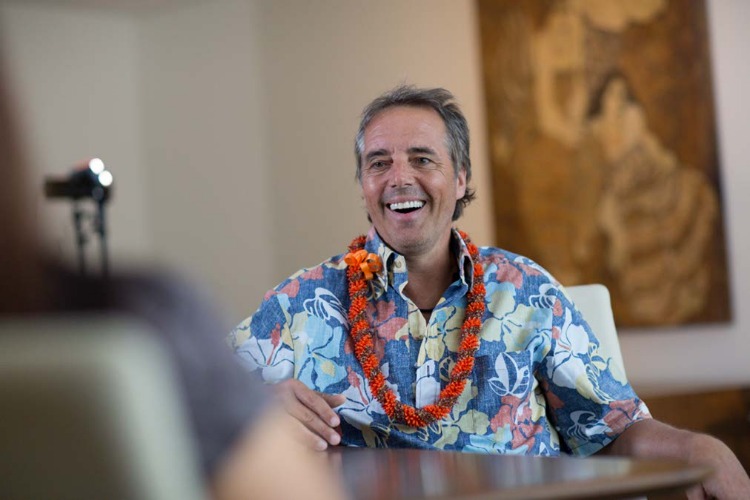
Tell me about your new book, “The Blue Zones Solution.”
Dan Buettner: The first book, “The Blue Zones” tried to identify what the world’s longest lived people do to live a long time and “The Blue Zones Solution” is a science of how you put it to work in your life. A big chunk of it is the diet of the longest lived people. What people who made it to 100, what did they really eat for most of their lives? So we did a meta-analysis of 155 dietary surveys to find out the average.
Part of it is, “How do you set up your home, your social network, and kind of the way you approach life, your internal environment, so the healthy choice becomes not only easy but unavoidable?” That you’re setting up all these nudges and defaults. The essence of the book essentially says that if you’re unhealthy in America, it’s probably not your fault.
In 1950, there were exactly two fast food restaurants in the U.S., they were both McDonald’s and two percent of people were obese. Now it the U.S., 55 percent of people are obese or overweight and there’s 155,000 fast food restaurants. Do you think it’s a connection? I’ll just let you answer that one but I will tell you, we’re not unhealthy because it’s a lack of our will or moral fortitude, it’s our environment.
Which Power 9 principle has the biggest impact on a person?
Dan Buettner: Knowing your sense of purpose. Knowing “Why do I wake up in the morning? What am I good at? What are my passions, besides what I do at my work?” (Most Americans don’t like their job). “What’s an outlet for what I really love to do?” And it’s especially important in older age. You see that among the older people, this kuleana, this notion that not only are you respected but there’s an expectation from you, there’s a responsibility. I think that internal drive, that internal feeling of self-worth, that’s what gets people out of bed. It gets them out of the easy chair, it gets them staying physically active, taking their medications, being engaged. If you don’t have that, you run out of gas in a hurry, you run out of the will to do things that may be healthy for you but require effort.
What are some of the items you buy every time you go to the grocery store?
Dan Buettner: Beans. Anyone can afford beans and I know how to make beans taste delicious. So I always buy beans. People can Google my Ikarian Stew recipe on my website and if they don’t like it, they can write me and I’ll give ‘em a dollar.
I always start my grocery shopping in the produce aisle, and I start stacking up there. And I usually just skirt the whole meat aisle altogether I don’t even walk down it anymore so I’m not tempted to go back to my old ways.
I will eat a little bit of fish. I’ve become more and more convinced that meat is a little bit like radiation. We know a lot of it is bad for you, there’s no question. Heavy meat eaters in this country are three or four times more likely to suffer from diabetes, heart disease, and big cancers than plant-based eaters. So we know a lot of it is bad for you, but a little of it is probably fine but we don’t know where the safe level ends.
What’s your guilty food pleasure?
Dan Buettner: Well, I had chocolate covered macadamias for dinner last night, four of them [laughs]. I like a bag of potato chips every now and again.
Another big point - there’s nothing about Blue Zones that restricts you. The deprivation diet is never going to work. People like to celebrate, they like to treat themselves when they’ve been working hard; they need comfort food. I think any diet that tells you, “You can’t do that,” is doomed to failure.
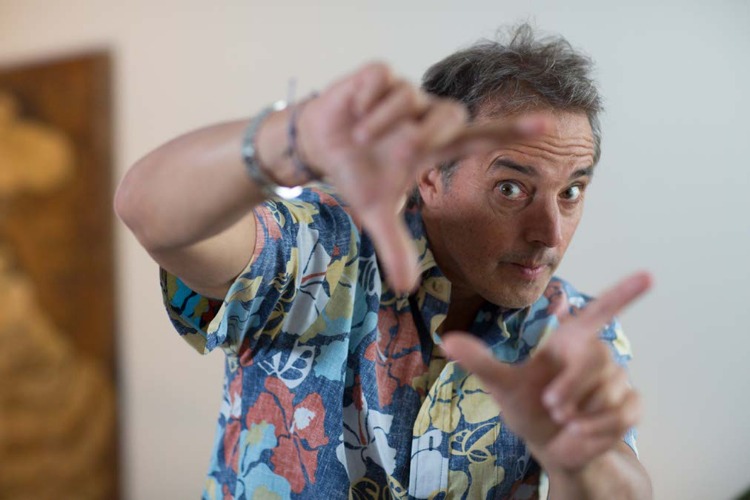 A little humor is an important component of well-being.
A little humor is an important component of well-being.
What do you think is public enemy number one in the American diet?
Dan Buettner: Soda pop. Yes. Not to pick on them, I’ll drink a soda every once in a while but it’s just too ubiquitous. Even in lunchrooms of companies that are otherwise healthy. Again, people should be free to have it but it’s always in your face and it’s got that delicious fizziness to it.
We drink about 15 billion gallons of soda pop a year. Every time you drink a 12-ounce Coke, you’re consuming the equivalent of 10 teaspoons of white sugar. You would never put 10 teaspoons of white sugar on your cereal in the morning but yet you drink them when you’re thirsty in a second. I think the quickest thing we can do to fight childhood obesity is to find alternatives, help the soda companies to find alternatives to sugar-sweetened beverages and maintain their profit margins because they deserve to be in business.
You’ve done a lot of work with children. What advice do you have for parents of young children that can help influence their habits?
Dan Buettner: Children lay down their lifelong tastes before age one so pregnant moms should start weaning themselves off the burgers and fries and pizzas and start eating some vegetables they like because those tastes will literally impart the fetus, and the rest is the first year of life. So maybe you’re eventually going to want to go back but if you really want to do your child a favor in the first year of life, get them to develop a taste for fruits and vegetables and do not napalm their taste buds with sodas and fats and chicken nuggets.
I’m a big advocate that moms and dads of children should never have the following four foods in their house: 1) processed meats, (indisputable associated with higher heart disease and cancer), (2) packaged sweets, (3) chips, and (4) soda pops.
I’m not saying never have them just never bring them into your house, you’ll cut out about 60 percent of your kids junk food eating right there.
Why is red wine the healthiest and what’s your favorite type?
Dan Buettner: Well red wine’s our fun beverage. It’s associated with lower rates of diabetes and lower rates of heart disease and we know that moderate drinkers outlive nondrinkers as a whole.
My favorite is Cannonau. It’s Sardinian, and because it’s this longevity wine that I found.
Many individuals have hectic schedules. How can they downshift daily?
Dan Buettner: The number one source of stress in our lives – this comes from a Nobel Prize winning psychologist – is our commute to work. Getting in our cars and driving back and forth to work. So if you really want to have less stress: (1) Walk if you can or drive and park far away and walk, (2) take public transportation, (3) carpool. Or move closer to work or find a new place to work. I would say that’s the number one way to downshift.
But other things – it’s not a bad idea for employers to have a place for employees to take a nap. Companies like Zappos actually have napping areas. Managers are going to kill me but we know that naps actually lower cortisol levels and reduce your chance of heart disease.
A policy at the workplace that encourage happy hours. Make happy hours easy for people, that’s a great way to de-stress.
A policy that allows people to pursue their faith. So if there’s a quiet place they can go to meditate or prayer or whatever they [do to] downshift, I think that’s an easy way to give employees a way to de-stress.
And then there’s sort of an existential stress when you show up to a workplace and you have no friends, so making it really easy or actually promoting coworkers to not get in each other’s privacy but to transcend the normal communication or just work and actually get to know your fellow coworkers as human beings.
How do you define well-being?
Dan Buettner: I think the biggest component of well-being is, “Am I healthy?” “Do I wake up in the morning and feel good?” “Do I have three or four friends that I can count on on a bad day?” And that requires effort, that doesn’t just naturally come to people. “Do I have meaningful work, either in my workplace or outside of my workplace?” “Am I raising successful children?” “Can I indulge my curiosities?”
I think those are all ingredients that approximate well-being.
Photos courtesy of Earl Yoshii.


